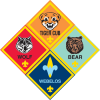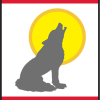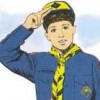Belt Loop
Complete these three requirements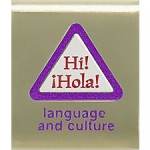
- With your parent’s or adult partner’s permission, talk with someone who grew up in a different country than you did. Find out what it was like and how it is different from your experience.
- Learn 10 words that are in a different language than your own.
- Play two games that originated in another country or culture.
Academics Pin
Earn the Language and Culture belt loop and complete five of the following requirements.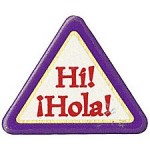
- Earn the BSA Interpreter Strip.
- Write the numbers 1–10 in Chinese or another number system other than the one we normally use (we use the Arabic system).
- Visit an embassy, consulate, or chargé d’affaires for another country.
- Make a display of stamps or postcards of another country. Explain the importance or symbolism of the things depicted to that country’s culture.
- Learn 30 words in a language other than your own. Practice saying these words with your den or an adult family member.
- Learn a song in another country’s language. Sing the song for your den or an adult family member, and then tell what the words mean.
- Say five words in American Sign Language. One of these words could be your first name.
- Visit a restaurant that specializes in recipes from another country.
- Watch a TV show or movie in a foreign language. Tell how easy or difficult it was to understand what was happening.
- With your parent’s or adult partner’s permission, interview an interpreter. Find out what his or her job is like.
- Make a list of 30 things around your home that were made in another country.
- Read a book or story about an immigrant to the United States. If the Scout’s first language is not English, then English may be used to satisfy the appropriate requirements.
Additional Information
Amazing Language Facts
- There are more than 2,700 languages in the world. In addition, there are more than 7,000 dialects. A dialect is a regional variety of a language that has different pronunciation, vocabulary, or meaning of words.
- The most difficult language to learn is Basque,which is spoken in northwestern Spain and southwestern France. It is not related to any other language in the world.
- All pilots on international flights identify themselves in English.
- The language in which a government conducts business is the official language of that country.
- More than a thousand different languages are spoken on the continent of Africa.
Saying “Hello” or “Good Day”
- Spanish: Hola
- German: Guten Tag
- French: Bonjour
- Japanese: Konichiwa
- Chinese: Ni hao
- Portuguese: Bom dia
- Hawaiian: Aloha
- Italian: Buon giorno
- Arabic: Al salaam a’alaykum
- Thai: sa-wa DEE Krab (boy)
- Russian: Zdravstvuite
- Tagalog: Magandang tanghali po
- Turkish: Merhaba
- Indonesian: Selamat pagi
- Greek: Kalimera
Resources
Local cultural societies can be an excellent resource for information and contacts about their culture and language. Libraries and museums are also excellent sources of information, along with the Internet. (Be sure you have your parent’s or adult partner’s permission first.) These organizations are advocates of early-age language programs:
Interpreter Strip Requirements
Go to http://www.scouting.org/scoutsource/Media/InsigniaGuide/05E.aspx to find a link to interpreter strip requirements.
Advocates for Language Learning
P.O. Box 4962
Culver City, CA 90231
Phone: 310-398-4103
American Sign Language
http://www.lifeprint.com

